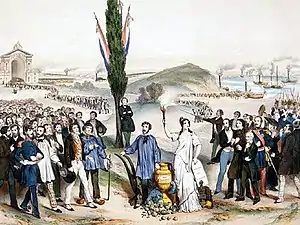Universal manhood suffrage
Universal manhood suffrage is a form of voting rights in which all adult male citizens within a political system are allowed to vote, regardless of income, property, religion, race, or any other qualification. It is sometimes summarized by the slogan, "one man, one vote".
History

In 1789, Revolutionary France adopted the Declaration of the Rights of Man and of the Citizen and, although short-lived, the National Convention was elected by all men in 1792.[1] It was revoked by the Directory in 1795. Universal male suffrage was re-established in France in the wake of the French Revolution of 1848.[2]
In the United States, the rise of Jacksonian democracy from the 1820s to 1850s led to a close approximation of universal manhood suffrage among white people being adopted in all states by 1856.[3] Poorer white male citizens gained representation; however, tax-paying requirements remained in five states until 1860, in two states until the 20th century, and many poor white people were later disenfranchised.[3] The expansion of suffrage was largely peaceful, excepting the Rhode Island Dorr Rebellion. Most African-American men remained excluded; though the Fifteenth Amendment to the United States Constitution, ratified in 1870, upheld their voting rights, they were denied the right to vote in many places for another century until the Civil Rights Movement gained passage of the Voting Rights Act of 1965 through Congress.
As women also began to win the right to vote during the late 19th and early 20th centuries, the goal of universal manhood suffrage was replaced by universal suffrage.
See also
References
- "The French Revolution II". Mars.wnec.edu. Archived from the original on 2008-08-27. Retrieved 2010-08-22.
- French National Assembly. "1848 "Désormais le bulletin de vote doit remplacer le fusil"" (in French). Retrieved 2009-09-26.
- Stanley L. Engerman, University of Rochester and NBER; Kenneth L. Sokoloff, University of California, Los Angeles and NBER (February 2005). "The Evolution of Suffrage Institutions in the New World" (PDF): 16, 35–36.
By 1840, only three states retained a property qualification, North Carolina (for some state-wide offices only), Rhode Island, and Virginia. In 1856, North Carolina was the last state to end the practice. Tax-paying qualifications were also gone in all but a few states by the Civil War, but they survived into the 20th century in Pennsylvania and Rhode Island.
Cite journal requires|journal=(help)CS1 maint: multiple names: authors list (link)